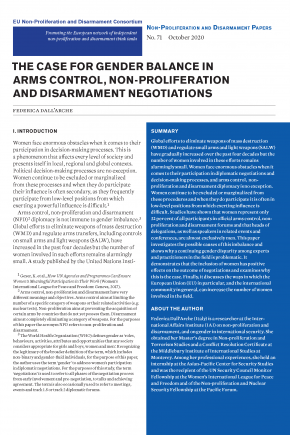The Case for Gender Balance in Arms Control, Non-proliferation and Disarmament Negotiations
Global efforts to eliminate weapons of mass destruction (WMD) and regulate small arms and light weapons (SALW) have gradually increased over the past four decades but the number of women involved in these efforts remains alarmingly small. Women face enormous obstacles when it comes to their participation in diplomatic negotiations and decision-making processes, and arms control, non-proliferation and disarmament diplomacy is no exception. Women continue to be excluded or marginalized from these procedures and when they do participate it is often in low-level positions from which exerting influence is difficult. Studies have shown that women represent only 32 per cent of all participants in official arms control, nonproliferation and disarmament forums and that heads of delegations, as well as speakers in related events and conferences, are almost exclusively men. This paper investigates the possible causes of this imbalance and shows why a continuing gender disparity among experts and practitioners in the field is problematic. It demonstrates that the inclusion of women has positive effects on the outcome of negotiations and examines why this is the case. Finally, it discusses the ways in which the European Union (EU) in particular, and the international community in general, can increase the number of women involved in the field.
I. Introduction
II. Gender balance in arms control, non-proliferation and disarmament diplomacy: Why is it important?
III. The current status of women's participation in negotiating processes
IV. The status of women's participation in arms control, non-proliferation and disarmament diplomacy
V. Causes of gender imbalance in arms control, non-proliferation and disarmament diplomacy
VI. Recommendations

